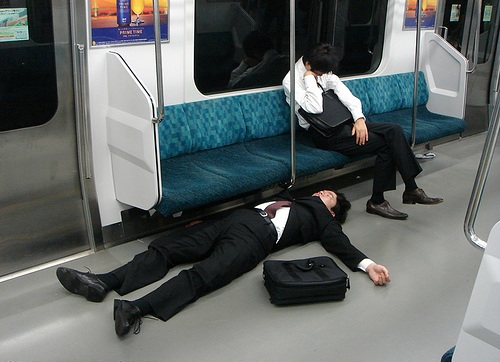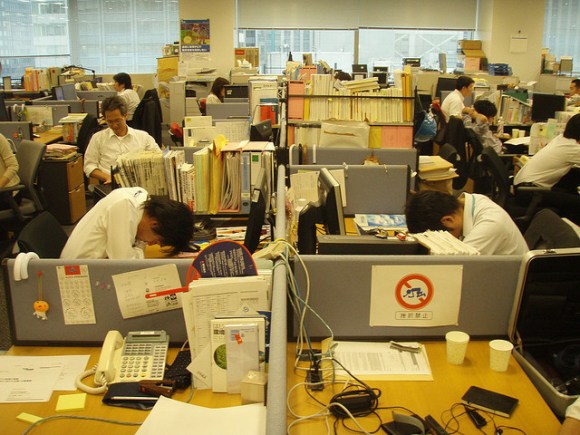
Japanese workers are famous for their seemingly inexhaustible dedication to their companies and ability to work long, long hours. Japanese even has a specific word for death from overwork: karōshi (過労死). But is this work ethic something that Westerners ought to admire, or is Japan in need of a holiday?
Japan Today asked foreigners “Why do you think Japanese work such long hours?” and received a huge amount of comments from people who had experienced life in a Japanese company. The responses were overwhelmingly negative about the Japanese work ethos, and many believe a shift in attitudes towards work right across society is necessary. Five points in particular stood out as particularly problematic.
There are plenty of extreme examples. On August 11, Watami Foodservice Co. had the extremely dubious honour of being awarded first prize in the “Black Corporation Awards 2013″, which assesses Japanese companies on discrimination, overwork, harassment, and so on. The company is accused of driving a new female employee to suicide just two months after joining the company – the insurance examiner calculated that the woman’s monthly overtime work exceeded 140 hours.
The problems in Japan’s workplaces aren’t just limited to the “black companies”, however. You can find people working late into the night in most of Japan’s offices, irrespective of the field or time of year. But does more overtime necessarily mean better results for the company? And do Japanese people really love their work so much that they’re prepared to put their health at risk? Japan Today’s survey suggests that all is not well in the Office of the Rising Sun.
- Problem 1: Company loyalty
Compared to Europe and America, where it is common to change companies in pursuit of a higher salary and better working conditions, Japan is well-known for its “lifetime employment” system which has created a climate of strong company loyalty. There are many companies that express this with inclusive phrases such as “team spirit” or “team work”, but it’s essentially the same meaning.
Japanese workers have to show their company spirit even if those extra evening hours don’t amount to anything productive getting done. (paulinusa)
I worked in a kaisha for two years and … I witnessed that they sleep at their desks to show exhaustion from work. So basically two hours asleep means they have to stay at least two hours after standard working hours. And also it is considered bad to leave before your boss and as most of time the boss has a boring life waiting for him back home he just sits there surfing the web or reading a newspaper while the other workers are dying to get home or out. (Kakukakushikajika)
For foreigners who see nothing wrong with transferring companies in order to advance their own career, it’s hard to understand why Japanese people feel so tied to their company, especially when their working conditions may be less than ideal. Japanese people often speak of loving their company and being proud to work there; it may never even cross their mind to question their loyalty to the company.
- Problem 2: Low productivity
Many people pointed out the low productivity of Japanese companies. In other words, while there are lots of people putting in lots of hours, work seems to take longer. Employees don’t seem to try to finish their work within a set time limit, even going so far as to purposely drag out tasks in order to seem like they are working harder and putting in the extra effort.
My impression seems to be that while people are “working” long hours, a survey of how much time is being spent on smoke breaks, toilet breaks, sneaky phone calls, long lunch breaks etc would probably find that the average office worker only does about 5 – 6 hours of work. (Daniel Sullivan)
Most Japanese do not work hard, they just spend countless hours wasting time on pointless paperwork and irrelevant procedures. (Saxon Salute)
Some pretty harsh comments there, but is there an element of truth? Many foreigners make it their priority to work during their set hours, and leave when those hours are done. The impression many Japanese office workers give is that the hours on their contract are fairly irrelevant – as long as they are working more than those hours.
- Problem 3: They don’t actually work more
There were plenty of comments talking about the lack of actual work getting done at Japanese companies. So really, it’s not about working long hours, but about being there for long hours.
When I first lived in Japan I was having a conversation with an older Japanese guy who had lived and worked in Sydney, Australia. He told me that Japanese people will always tell you how hard their working life is, and how hard they work etc etc. But he said this was BS. He felt that the Australians he worked with worked much harder to get the job done by 5pm so they could go home. He said Japanese workers just dawdle and waste time and spend much longer in the office. I also often witnessed people sleeping at their desks when I worked in Japan – a sackable offence where I come from. (Tamarama)
Japanese workers would probably insist that they do work hard, but it seems like the meaning of “working hard” is measured differently in Japanese and foreign workplaces.
- Problem 4: They “don’t know how to relax”
It often seems to foreigners that Japanese people have no time for anything outside of work, yet no one ever seems to go on strike to protest this state of affairs. Some people wonder if this is because Japanese people simply don’t know what to do with themselves in their free time.
From childhood their lives revolve around institutions- club, school, juku [cram school]. They have no idea what to do with their free time. In my childhood, my friends and I had hours/days/weeks of free time in which we learned to amuse ourselves. Lots of kids here are on “salaryman” schedules from a young age. 6am to 9pm – morning practice, school, after-school club, juku. (bgaudry)
- Problem 5: Fear
Many people expressed the opinion that Japanese people are simply too scared to change the status quo and risk kicking up a fuss.
They need to work late trying to figure out what to do with all that time. Seriously, at the bottom line it is fear. Mainly, the fear that, if things aren’t successful, it won’t be because they weren’t putting in the hours. (yabits)
I think the economy and the fear of losing one’s job has a lot to do with it. Japan also has a long history of being a stationary culture. One’s life is defined by their occupation, which comes before family, hobbies, or other personal/private goals or endeavors. People don’t change career or move around all that much, therefore sacrificing your “other time” for work is not really seen as a big problem. (Thomas Proskow)
As a foreigner it may seem obvious that people just need to take a stand and go home when their contract states they can. However, it’s obviously a lot more complex than that, with pressure coming not only from fear of the judgement of coworkers and superiors, but also fear of changing a whole way of life you’ve been brought up with. After all, going your own way when everyone around you says differently can’t be easy.
- Conclusion
During Japan’s economic golden years, the West looked to Japanese companies as a model for how to achieve economic growth. However, these days Japan’s working environment is often criticised by foreigners, and seen as detrimental in a fast-changing and globalising world. There is also concern for the workers, as well as frustration – surely no-one actually enjoys working these ridiculous hours, so why don’t they just say “enough is enough”? Looking from a foreign perspective, it seems easy enough, but the Japanese have a whole lifetime of cultural norms standing in their way. No one wants to be the one to go home early (i.e. on time), and give off the impression of not caring about the “group”, and you can be sure that those who do are talked about by their colleagues.
Working in a Japanese company as a foreigner can be endlessly frustrating, however we are also relatively free from the societal pressures that our coworkers experience, both consciously and subconsciously. From our position we have the ability to assess the negatives and embrace the positives. Maybe we can learn a little more about loyalty and being a team player, while showing our exhausted coworkers that there might be more to life than work.
Source: Madame Riri, Japan Today (quotes)
Images: The Runaway Guide, Pouch


 Over 30 percent of surveyed Japanese managers feel intense stress from working with foreigners
Over 30 percent of surveyed Japanese managers feel intense stress from working with foreigners Meetings and more meetings: Foreigners list the pros and cons of working at a Japanese company
Meetings and more meetings: Foreigners list the pros and cons of working at a Japanese company Five things that shock Japanese people living abroad
Five things that shock Japanese people living abroad The five least stressful jobs, as ranked by Japanese working people
The five least stressful jobs, as ranked by Japanese working people Study reveals staff shortage in Japanese firms, suggests a need to accept low-skilled foreigners
Study reveals staff shortage in Japanese firms, suggests a need to accept low-skilled foreigners Japan Extreme Budget Travel! A trip from Tokyo to Izumo for just 30,000 yen [Part 1]
Japan Extreme Budget Travel! A trip from Tokyo to Izumo for just 30,000 yen [Part 1] Japanese drugstore sells onigiri at pre-stupid era prices, but how do they compare to 7-Eleven?
Japanese drugstore sells onigiri at pre-stupid era prices, but how do they compare to 7-Eleven? Starbucks Japan releases first-ever Hinamatsuri Girls’ Day Frappuccino
Starbucks Japan releases first-ever Hinamatsuri Girls’ Day Frappuccino New giant Pokémon plushie is so big it looks like it could eat you【Photos】
New giant Pokémon plushie is so big it looks like it could eat you【Photos】 A look back on 40 years of Japanese schools banning stuff
A look back on 40 years of Japanese schools banning stuff Saitama is home to the best strawberries in Japan that you’ve probably never even heard of
Saitama is home to the best strawberries in Japan that you’ve probably never even heard of Princess Mononoke gets first-ever IMAX screenings to show off gorgeous new remaster【Video】
Princess Mononoke gets first-ever IMAX screenings to show off gorgeous new remaster【Video】 Tokyo Skytree turns pink for the cherry blossom season
Tokyo Skytree turns pink for the cherry blossom season Fate/stay night and Axe body spray partner up in attempt to make anime fans smell nice
Fate/stay night and Axe body spray partner up in attempt to make anime fans smell nice Survey finds that one in five high schoolers don’t know who music legend Masaharu Fukuyama is
Survey finds that one in five high schoolers don’t know who music legend Masaharu Fukuyama is The 10 most annoying things foreign tourists do on Japanese trains, according to locals
The 10 most annoying things foreign tourists do on Japanese trains, according to locals Highest Starbucks in Japan set to open this spring in the Tokyo sky
Highest Starbucks in Japan set to open this spring in the Tokyo sky Starbucks Japan releases new sakura goods and drinkware for cherry blossom season 2026
Starbucks Japan releases new sakura goods and drinkware for cherry blossom season 2026 Japan’s new “Cunte” contact lenses aren’t pronounced like you’re probably thinking they are
Japan’s new “Cunte” contact lenses aren’t pronounced like you’re probably thinking they are Shibuya Station’s Hachiko Gate and Yamanote Line stairway locations change next month
Shibuya Station’s Hachiko Gate and Yamanote Line stairway locations change next month Yakuzen ramen restaurant in Tokyo is very different to a yakuza ramen restaurant
Yakuzen ramen restaurant in Tokyo is very different to a yakuza ramen restaurant Starbucks Japan adds new sakura Frappuccino and cherry blossom drinks to the menu
Starbucks Japan adds new sakura Frappuccino and cherry blossom drinks to the menu Japan just had its first same-month foreign tourist decrease in four years
Japan just had its first same-month foreign tourist decrease in four years Burning through cash just to throw things away tops list of headaches when moving house in Japan
Burning through cash just to throw things away tops list of headaches when moving house in Japan Japan’s newest Shinkansen has no seats…or passengers [Video]
Japan’s newest Shinkansen has no seats…or passengers [Video] Foreigners accounting for over 80 percent of off-course skiers needing rescue in Japan’s Hokkaido
Foreigners accounting for over 80 percent of off-course skiers needing rescue in Japan’s Hokkaido Super-salty pizza sends six kids to the hospital in Japan, linguistics blamed
Super-salty pizza sends six kids to the hospital in Japan, linguistics blamed Starbucks Japan unveils new sakura Frappuccino for cherry blossom season 2026
Starbucks Japan unveils new sakura Frappuccino for cherry blossom season 2026 Foreign tourists in Japan will get free Shinkansen tickets to promote regional tourism
Foreign tourists in Japan will get free Shinkansen tickets to promote regional tourism Take a trip to Japan’s Dododo Land, the most irritating place on Earth
Take a trip to Japan’s Dododo Land, the most irritating place on Earth Naruto and Converse team up for new line of shinobi sneakers[Photos]
Naruto and Converse team up for new line of shinobi sneakers[Photos] Is China’s don’t-go-to-Japan warning affecting the lines at a popular Tokyo gyukatsu restaurant?
Is China’s don’t-go-to-Japan warning affecting the lines at a popular Tokyo gyukatsu restaurant? Survey asks foreign tourists what bothered them in Japan, more than half gave same answer
Survey asks foreign tourists what bothered them in Japan, more than half gave same answer Japan’s human washing machines will go on sale to general public, demos to be held in Tokyo
Japan’s human washing machines will go on sale to general public, demos to be held in Tokyo Starbucks Japan releases new drinkware and goods for Valentine’s Day
Starbucks Japan releases new drinkware and goods for Valentine’s Day We deeply regret going into this tunnel on our walk in the mountains of Japan
We deeply regret going into this tunnel on our walk in the mountains of Japan Studio Ghibli releases Kodama forest spirits from Princess Mononoke to light up your home
Studio Ghibli releases Kodama forest spirits from Princess Mononoke to light up your home Major Japanese hotel chain says reservations via overseas booking sites may not be valid
Major Japanese hotel chain says reservations via overseas booking sites may not be valid Put sesame oil in your coffee? Japanese maker says it’s the best way to start your day【Taste test】
Put sesame oil in your coffee? Japanese maker says it’s the best way to start your day【Taste test】 No more using real katana for tourism activities, Japan’s National Police Agency says
No more using real katana for tourism activities, Japan’s National Police Agency says Looking for a job in Japan? Try a convenience store!
Looking for a job in Japan? Try a convenience store! 6 things Japanese expats miss most about Japan
6 things Japanese expats miss most about Japan Why Foreign Businessmen are Receiving Lessons on Doing Business the Japanese Way
Why Foreign Businessmen are Receiving Lessons on Doing Business the Japanese Way 10 weird and funny things Japanese people do
10 weird and funny things Japanese people do Despite their hardworking image, are the Japanese really just as lazy as the rest of us?
Despite their hardworking image, are the Japanese really just as lazy as the rest of us? Eight things people realized were pointless about Japanese work culture during 2020
Eight things people realized were pointless about Japanese work culture during 2020 Twitter thread sparks debate on Japanese vs American sick leave policies, overwork culture
Twitter thread sparks debate on Japanese vs American sick leave policies, overwork culture W.T.F. Japan: Top 5 strange Japanese office occurrences【Weird Top Five】
W.T.F. Japan: Top 5 strange Japanese office occurrences【Weird Top Five】 Survey asks Japanese people where they’d most like to “live” after death
Survey asks Japanese people where they’d most like to “live” after death Nearly one in four Japanese adults admits to crying in the office bathroom in new survey
Nearly one in four Japanese adults admits to crying in the office bathroom in new survey English reactions to A Day in the Life of a Japanese Salaryman video sadden Japanese netizens
English reactions to A Day in the Life of a Japanese Salaryman video sadden Japanese netizens Is this common Japanese phrase for “goodbye” the reason for Japan’s crazy overtime hours?
Is this common Japanese phrase for “goodbye” the reason for Japan’s crazy overtime hours? Japanese salaryman fears backlash against attractive people due to company paternity leave system
Japanese salaryman fears backlash against attractive people due to company paternity leave system 10 things Japan gets horribly wrong
10 things Japan gets horribly wrong